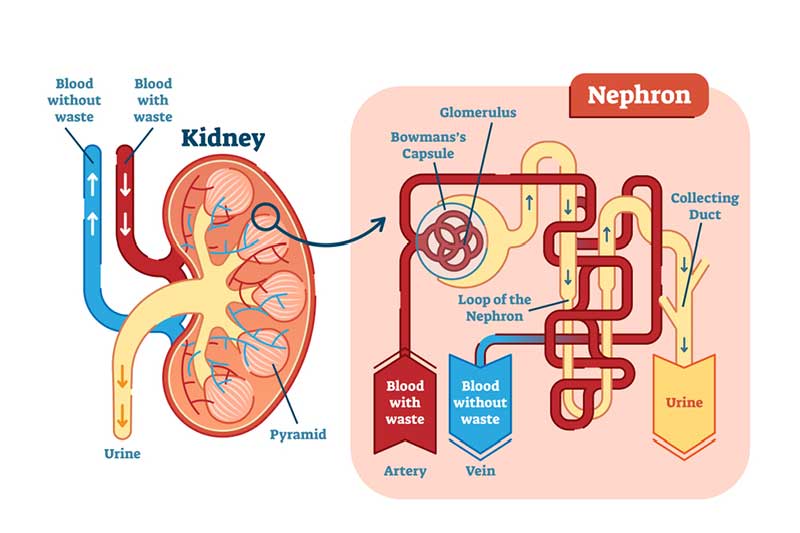The main functions of kidney
In this article, we’ll discuss the function of the kidney and how does it work? The kidneys are two bean-shaped organs in our lower abdomen. They pass liquid body waste through urine and also filter blood to keep it clean.
Key functions of the kidney include:
- Maintaining overall body fluid balance
- Circulating and filtering waste from the blood
- Filtering waste from food and toxic substances from our body
- It helps produce red blood cells
- Release hormone that regulates blood pressure
- Initiate Vitamin D to maintain healthy bones
- Keeping a balance of minerals in the blood
Each kidney contains about 1 million nephrons, which are responsible for the right and left kidney function. They take blood vessels, filter and help pass waste through urine and send back blood to the heart.
The Main Risk Factors for kidney diseases are:
- Diabetes
- High Blood Pressure
- Genetic/ Family history of kidney disease
- Cardiovascular disease
Here are a few additional risk factors:
- Age 60 years or older
- Obesity
- Low birth weight
- Taking painkillers or nonsteroidal anti-inflammatory drugs for a long time
- Lumps or autoimmune disorders
- Chronic urinary tract infection
- Kidney stones
Kidneys perform various important works for our body to be stable and healthy, but due to the toxins and wastes they encounter, the kidney may get infected with various problems.
Some of them are:
- Chronic kidney disease
- Kidney failure
- Kidney stone
- Urinary tract infections
- Uremia
- Kidney cysts
- Nephrotic syndrome
- Glomerulonephritis
- Polycystic kidney disease
As the kidney is in direct contact with toxins and wastes so it gets affected, here is how we can understand whether the kidney has a problem. It’s important to eat a balanced diet and stay hydrated to promote kidney function and maintain overall health.
Common symptoms for kidney diseases or warning signs are:
- Fatigue
- Blood in urine
- Foamy urine
- Swelling in ankle and foot
- Dry or itchy skin
- Muscle cramps
- Puffiness around the eyes
- Increased or decreased urine
- Inability to concentrate
- Low appetite
- Trouble sleeping
These are a few common symptoms which suspect a person to have a kidney problem. In case you notice any of the symptoms, contact a nephrologist or urologist. Depending on your situation, the doctor may do a kidney function test to make a diagnosis.
The kidneys are important organs that affect many body parts directly including the heart so keeping them healthy is one of the important work to do.



